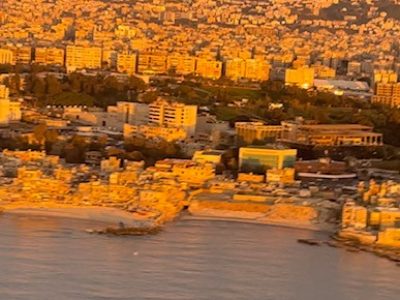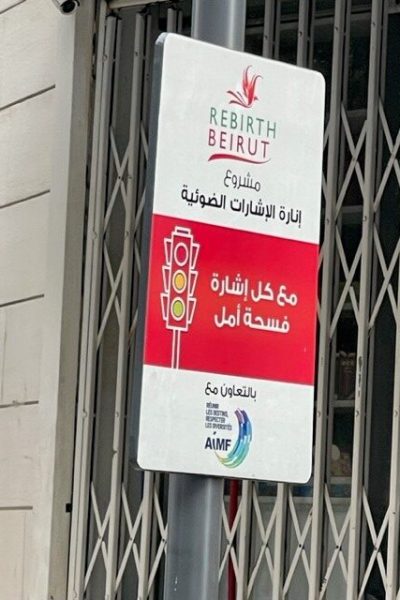A Lebanese Habit
People are talking in biblical terms these days in Lebanon. Damnation, retribution, reckonings, deliverance, and the lot.
We’ve always felt accursed, mind you. Special, yes, and beautiful. Clever too. And all the more accursed because of it. A peculiar psychology, I’ll admit. Something about the geography and its laws, the friends we keep, the admirers we have, the way the stars are aligned, the small “gods” watching over us and the great many bowing to them.
You know that, in this Levant, there has never been a day free of crisis or calamity or bad omens or bad tidings or bad something or other. And now they’re all lining up, aren’t they, as if an army.

But we Lebanese have a knack for seeing in the worst of situations the face of salvation itself. It’s more a habit, a gut feeling, than anything based on a careful reading of anything. We just know that when we are about to keel over, providence intervenes.
Five years ago, when many of us understood the depth of the abyss into which we were falling with threads for rope, someone whistled not so.

He was very optimistic about Lebanon, he said. It wasn’t economic information he alone was privy to, or political insights inaccessible to the rest of us. It’s just that he had heard from a Lebanese friend in the American embassy that the huge size of the new compound in Awkar towards the north was because the Americans were going to use the country as a hub for the American companies gearing up to rebuild Syria. The Halliburtons and Bechtels of this world, in his telling, would settle here with their families as they proceed to put Syria back together again a few miles away.
Why would the Americans build such a sprawling embassy here if we were that small and irrelevant?
So, this businessman went ahead and put his money where his mouth was. He paid twice the actual worth of the Lebanese company he was acquiring. I’ve never met the man. I heard his story back then from a close friend who was present when he shared his rationale for paying premium money for the trading outfit. We were marveling at the man’s decision and wondering if we should feel sorry for him or for us.
I don’t know what has happened to this gentleman or what he is thinking. But my bet is that he, like every other Lebanese, is still in the anticipation business, sniffing for signs of the salvation to come.
Rumors, for example, have been flying around over the past few months that Qatar is investing in Lebanon. Real estate and some such investments, they say. And of course, the chattering class almost immediately began to perk up at the sure inflow of more goodies.
Why would Qataris invest millions of USDs in Lebanon if we were that small and irrelevant?
We’ve had such episodes before, of course.
When the late prime minister Rafiq Hariri pushed through the 1989 Taef Accords, under Syria and Saudi Arabian patronage, that presumably ushered in peace and prosperity, we felt giddy with anticipation. And who wouldn’t be after 15 years of blood? Adding to our sense of giddiness was the greenback size of Hariri himself. We thought what’s his is ours. Too bad it turned out to be the other way around.
But we asked ourselves then, why would these two mighty regional patrons, with US blessings, deploy a tycoonish Hariri, spread the cash (Saudi Arabia) and bang Lebanese heads together (Syria) in Taef if we were that small and irrelevant?
When President Emanual Macron landed very soon after the Beirut Port explosion in 2019, people wondered what treats might he be carrying with him.
Because why would the French president come visit with us, with Fairouz (our Edith Piaff), with the ruling mafia, and walk the streets of Gimmeyzeh, hugging everyone that needed a hug, if we were that small and irrelevant?
When, in 2022, Hezbollah and the US chaperoned a maritime deal between Lebanon and Israel, we were sure that very soon gas will flow, USDs will rain down on us, and we will escape yet another near-death experience.
Because why would Hezbollah and Israel and America make this deal–and it is a big deal–if we were that small and irrelevant?
And when the US last week, in a chin-scratching turnaround, appeared to signal that it might be dropping Riad Salameh, the Governor of the Central Bank, we began to ponder the exits planned.
Apparently, the fellow (aka Salameh) has been facilitating Hezbollah’s money laundering operations all these years. And the US is shocked, just shocked, at the recent revelations. Who would have even suspected? All these decades, with all this close collaboration and that protection, all those watchful eyes and these listening ears, all those intimate lunches and these cozy dinners…
So, nope, the gov. can’t just retire and fade into Cap Antibes’ sunset, we’re hearing. He will be punished. So sanctions it is, or so we are led to believe, against a man that senior American officials only a few months ago were declaring “critical to the stability of Lebanon,” a redline, a no-go zone, off the table.
Why would the US be hanging the maestro orchestrating the elite’s massive corruptions, including, of course, his own, if the US was not finally at that drawing board designing our exits. And why would it be doing that if we were that small and irrelevant?
For reassurance, we have context: the freefalling LBP, reaching 80,000 to the US dollar, the Central Bank losing control, the parliament all but paralyzed, the government nothing more than a care taker, the presidential palace empty, and, in a televised speech only last week, Hezbollah’s Hassan Nassrallah, the mightiest man in the country, visibly fretting that he can no longer hold the fort.
All ready for deliverance, then.
It’s not that many of these instances I mention and others I skip don’t contain a kernel of truth in them. As I have written in this post and elsewhere, we in Lebanon, especially the elites and their chatterers, have long grown used to being bailed out. Not in any genuinely serious way, but in that way that involves a leg up, a pass, a break, and enough cash to float the system for anywhere between five and ten years.
In fact, most of us, to be honest, don’t want our supposed saviors to be genuinely serious with us at all. That’s the message that our rulers have been consistently sending out to anyone who will listen.
And if we are not small and irrelevant, surely someone out there is still listening.
****
On Another Note
Did you know that Raï music sprang in Algeria’s countryside? And did you think that it was all but dead? Not so, as Melissa Chemam writes in The Markaz Review:
The most recent illustration of raï’s enduring legacy is a new French TV series, Raï Is Not Dead, produced by the Franco-German television channel ARTE and ZED production. The documentary episodes follow Algerian-French DJ and record collector Hadj Sameer, as he takes viewers on a journey from Barbès Rochechouart in Paris to the motherland, Oran and Algiers, Algeria, as well as raï hotbeds like Lyon and Marseille.
